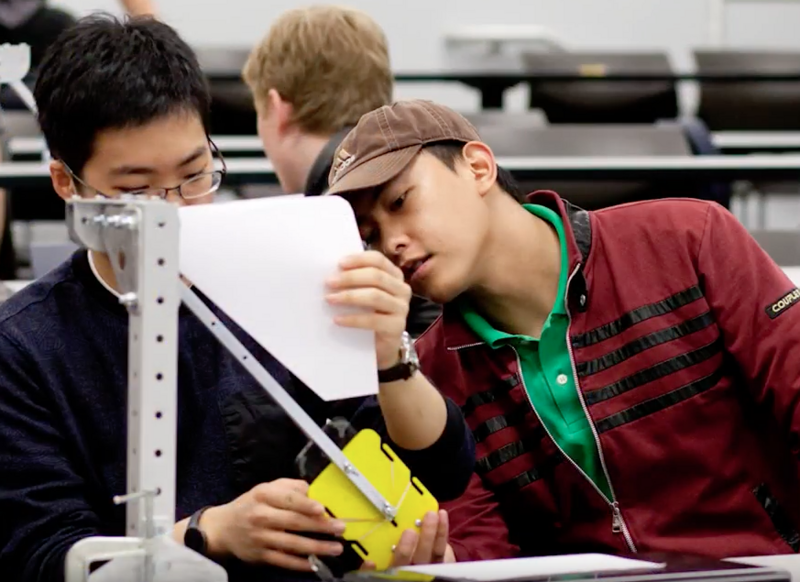July 21, 2017
A ladder for tomorrow's workforce
It's undergraduate research — with a twist — thanks to a program pioneered at Georgia Tech

A college education isn’t what it used to be.
It’s a lot more.
If you want evidence, consider a program at Georgia Tech. It’s proved so successful, universities around the country are picking it up, including the University of Georgia.
The program gets undergrads to collaborate in what’s described as an on-campus startup company. Teams of students – from all kinds of disciplines – work with faculty, graduate students and post-docs on a single project.
Here’s the catch: The project they’re working on doesn’t last a semester or two. It extends for years … and years.
Students leave the team when they graduate. Newer students build on the work of those who came before them. And the collective effort advances the research aim of the faculty members involved – moving knowledge and discovery further down the road.
Called VIP, which stands for Vertically Integrated Projects, the program is the brainchild of GRA Eminent Scholar Ed Coyle of Georgia Tech. He pioneered the model while at Purdue University. But since being recruited to Georgia Tech in 2008, he’s developed it into an extraordinary model of learning that other universities are now embracing.
At its inception, VIP had just one team – the one Coyle brought with him, which worked to expand broadband capacity in sports arenas. This fall, that team will be joined by 55 others at Georgia Tech, involving hundreds of students and faculty.
“While the focus is on conducting research, the teams really are like small companies,” Coyle says. “They average 17 students, which is like a startup. Each semester, some graduate, just as employees retire in industry, while others are promoted.”
Most important, Coyle says, is that the students learn much more than the technology areas of focus – which range from underwater robotics to sustainable systems on Mars. “They gain a portfolio of professional skills, such as how to work on a complex project, how to ask for help, and how not to wait to be told what to do,” Coyle says.
Orin Lincoln agrees. A computer science graduate (Georgia Tech ’16), Lincoln worked on Coyle’s sports arena bandwidth squad, called Intelligent Digital Communications. Today, he develops software for Citrix.
“I’m now a ‘scrum leader’ for a project I’m working on,” Lincoln says, “and my VIP experience definitely helped prepare me for this job. A big part of my role on the VIP team was getting new people up to speed on our project, but without having them rely on me to answer every question. As a team leader at Citrix, I now have to manage others in a similar way.”
As the VIP program burgeoned at Georgia Tech, Coyle began to get interest from other universities around the country. In 2015, he and colleagues secured a three-year, $5 million grant from the Helmsley Charitable Trust to create the VIP Consortium, with the goal of exporting the model to other universities.
One that expressed interest was the University of Georgia. Erin Dolan, a professor of innovative science education, had been working at the University of Texas-Austin when she surveyed the landscape of innovation in teaching – and discovered VIP.
“I thought: This would be a cool way to push the envelope of innovation in teaching and research,” Dolan remembers.
She took a position at UGA but didn’t forget about VIP. “We have strong students in STEM at UGA – they’re graduating and staying in their fields,” she says. “But we do have issues of student awareness around career paths. VIP provides a really unique way to broaden their horizons.”
After bringing up VIP at a faculty meeting – at which several of her colleagues expressed interest – Dolan and her UGA colleagues spent a few days at Georgia Tech, getting an up-close look. This fall, UGA will launch its first two VIP teams. Dolan will serve as the faculty lead on a team exploring the social psychology of undergrad STEM research, and GRA Eminent Scholar Art Edison will head a team on big data.
Ed Coyle says UGA is one of 25 institutions nationwide that have implemented the VIP model, and five more are waiting in the wings. The interest, he says, is understandable.
“The experience of being on a team for two to three years is so much deeper than a senior project or class group assignment,” he says. “That’s what makes it novel.”
